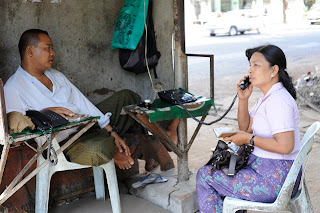 Burma is is much like India - or rather, I imagine, much like India was before it had millionaires or even a modern middle class. Like India, Burma has a the same recognisable British colonial legacy and is full to bursting with blinding colours and grinding poverty in a landscape composed of steep mountains, flat dusty plains and tropical bush.
Burma is is much like India - or rather, I imagine, much like India was before it had millionaires or even a modern middle class. Like India, Burma has a the same recognisable British colonial legacy and is full to bursting with blinding colours and grinding poverty in a landscape composed of steep mountains, flat dusty plains and tropical bush.It's much like India, but also much like Laos and northern Thailand; the Burmese have the same gentleness that characterizes the Laotians and Thais and the same remarkably unperturbed indifference to foreigners.
So maybe what Kipling wrote in 1898 remains true, 'This is Burma, and it is unlike any land you know about.'
Burma is more than just the collective attributes of its neighbours; but it's hard not to draw comparisons. The people are beautiful and subtle shifts in ethnicity are revealed as you travel up and down the country - some look almost Indian, others thoroughly Chinese - and everything in between.
A universal feature amongst the Burmese seems to be the application of Thanaka, a cream coloured paste worn decoratively as make-up, but also as protection against the sun and is said to have cooling properties. It seems to most often be worn in a thick smear beneath the eyes, not unlike a tobacco-chewing American baseball player.
Burma is perhaps less reliant on modern technology than anywhere I have ever been. Power cuts were constant, but unsurprising. What did surprise me was the almost complete absence of cell phones. I think of cell phones as a fairly democratic piece of technology these days, you can pick up a cheap Nokia for $10 just about anywhere. I suspect in Burma, the issue is not the cost of the phone but that phone networks barely exist and there is, almost literally, no one to call.
I suspect landlines in the home are also fairly uncommon. The typical Burmese phone booth looks something like this:
An attendant sits in a dingy stall on the side of a road with a range of phones (that have probably not been manufactured in the developed world for about 15 years) - and people come along and pay to use them.
Users battle the noise of passing pedestrians and traffic and of course every word you say is over heard - not an ideal setting for an intimate conversation or conducting business.
With the exception of Coca-Cola and a few car and electronics companies - and Singapore is making a big play with Tiger beer - there are virtually no international brands. Everything in Burma, is made in Burma - making most goods cheap - in both meanings of the word. Mastercard is the first (and this is within the last year or so) and only credit card that has any presence, in the entire country. International banks are non-existent.
Burma is like stepping back in time in a way that is utterly refreshing, yet also makes you wince. Even our fairly modest trip, on a modest budget made me feel a bit like a modern-day Marie Antoinette.




